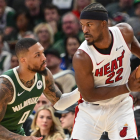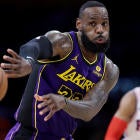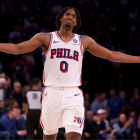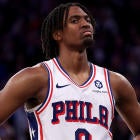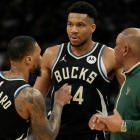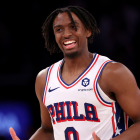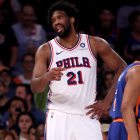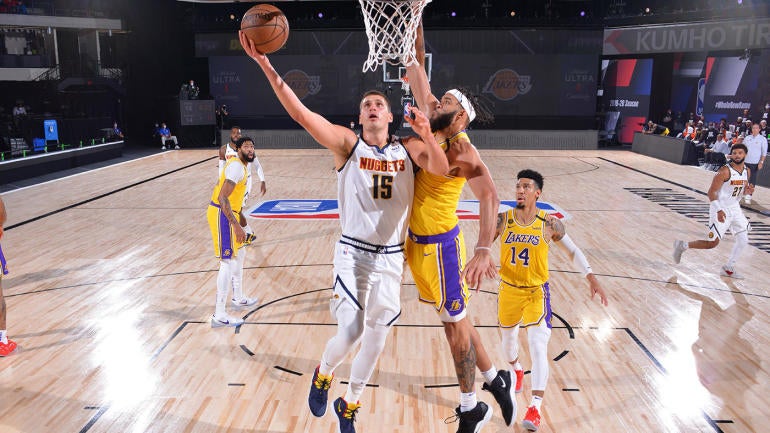
On Sept. 6, the Los Angeles Lakers evened their second-round series against the Houston Rockets, thanks to 62 combined points from LeBron James and Anthony Davis and a flabbergasting first-quarter run spearheaded by Rajon Rondo and Markieff Morris. On a Zoom conference the next day, coach Frank Vogel said the ways they wanted to attack Houston were becoming clearer. Vogel loved their energy and commitment to the defensive game plan.
At the time, there were reasons for skepticism. Beyond the seemingly miraculous stuff from Rondo and Morris, Los Angeles was fortunate that Rockets guard Russell Westbrook took seven 3s, missed six of them and turned the ball over seven times. The Lakers won 117-109, but only after losing the 21-point first-half lead they had built. Had Westbrook had played a merely average game, rather than an actively harmful one, the popular takeaway would be that Los Angeles couldn't handle Houston's "unconventional" attack.
Now that the Rockets have flamed out, left the bubble and parted ways with their coach -- and we've seen the Los Angeles Clippers collapse more slowly and dramatically -- that Lakers skepticism feels way more than 12 days old. But has Los Angeles answered all the questions it faced a couple of weeks ago? Are they about to annihilate the Denver Nuggets in the Western Conference finals?
I say no. The victory over Houston, which required them to shelve their traditional centers, treat Westbrook like Tony Allen and trap James Harden late in the shot clock, was impressive. It does not, however, necessarily mean anything about their chances against Denver, a team that presents entirely different challenges.
Of the CBS Sports' eight NBA writers, I was the only one to pick the Nuggets to win the series. Here is the case for Denver making the Finals:
1. Counterpunches
The Nuggets are nothing if not resilient. It is not just that they have come back from down 3-1 in two consecutive series; it is that they have counterpunches they've been honing for years. Jokic and Murray are an offense unto themselves, as is the ecosystem of screens and cuts when Jokic has the ball at the the elbow or in the post. Jokic's shooting allows them to play five-out, and Mason Plumlee's passing allows them to play the same style with the second unit.
Misguided as rookie Michael Porter Jr. may have been to publicly criticize Denver's play-calling after Game 4, he was correct about its need to be unpredictable and involve multiple players, himself included, on offense. Porter's presence has given the Nuggets a new dimension, another scorer that the defense has to worry about, another bailout option at the end of the shot clock. More important, though, is that Denver has vastly improved during the playoffs when it comes to masking his defensive shortcomings, and that Porter developed chemistry with Jokic in no time.
Stylistically, the Lakers could hardly be more different. Everybody knows LeBron James is going to make the vast majority of the plays, which isn't a problem in and of itself — you don't get extra points for pretty ball movement. The problem is that, at its worst, Los Angeles' offense can be cramped and stagnant. In the halfcourt, it ranked 19th in the regular season and 24th in the last third of it (from the beginning of February until the final seeding game). At 35, James another MVP-caliber season, but he could've been even better if he didn't have to do so much.
There are layers upon layers of irony here. James might be the most versatile player in NBA history. You can run offense through him and Davis from practically anywhere on the floor, and, back in James' days with the Miami Heat, he was a devastating off-ball player, too. After James signed with the Lakers, then-Lakers president Magic Johnson said the roster was built for the playoffs: Johnson targeted players who could break defenses down, rather than simply surrounding James with shooters.
The experiment was a full-fledged disaster. The 2018-19 Lakers could pass and dribble, but it didn't matter because they couldn't shoot and everybody -- James, Rondo, Brandon Ingram, Lonzo Ball, Kyle Kuzma, Lance Stephenson, Michael Beasley -- wanted the ball. But Johnson was onto something: 3-and-D is not enough anymore, and this year's roster represents an overcorrection. After trading for Davis and signing Danny Green, the Lakers were so bereft of perimeter playmakers that they made James the nominal point guard. When they couldn't coerce Darren Collison out of retirement or find a difference-maker on the trade market, they signed Dion Waiters off the scrap heap.
If Los Angeles' wings and centers were better passers, maybe it wouldn't matter that James and Davis have to do so much of the heavy lifting. The bigger problem, though, is that the stars still don't have reliable shooting around them. From the All-Star break until the end of the seeding games, the Lakers made 30.9 percent of their 3s, the second-worst mark in the NBA.
These flaws have faded into the background lately. Los Angeles didn't have any trouble scoring against the Portland Trail Blazers' dismal defense, at least after Game 1, and the same was true against the Rockets, whose switch-heavy defense wasn't nearly as connected as it was earlier in the bubble, particularly without Danuel House. Rondo gave the Lakers the extra creator they were looking for, and taking the bigs out of the mix -- and out of the way -- made life easier on everybody. Which brings us to…
2. The Lakers' dilemma
Jokic changes everything. "We adjusted to a smallball team last series," Vogel said Wednesday, "but I would expect us to return to form," implying that JaVale McGee or Dwight Howard or both would return to the rotation against Denver.
If this is the case, why would the Lakers' offense look the same as it did in the Rockets series? When they play a big next to James and Davis, the book is out on Los Angeles: Get back in transition, protect the paint, show help against the stars and make the role players shoot contested 3s or put the ball on the floor.
The Nuggets are not an elite defensive team, and it is easy to point to Jokic's pick-and-roll defense as a cause for concern. He is most vulnerable, though, against quick point guards who shoot pull-up 3s, like, say, Donovan Mitchell. Jokic fared just fine in the second round, and while James is better than anyone on the Clippers' roster at manipulating defenses, he will have to do that despite Denver completely ignoring Rondo, disrespecting Davis' 3-point shot and having a defender near the rim whenever a traditional center is on the court.
The Lakers' two series-opening losses weren't predictive of the games that followed, but that doesn't mean they were meaningless. The mere fact that Portland would so brazenly pack the paint and dare anybody to shoot 3s is telling, as is this clip of James driving into traffic against Houston and then yelling about all the congestion:
Lebron James says "There's no spacing" pic.twitter.com/qruxbz3IGf
— Main Team (@MainTeamSports) September 5, 2020
The counter is to go centerless again. Los Angeles is not really small with Davis at the 5, anyway, as Kuzma pointed out on Wednesday. And wasn't the whole point of playing Davis almost exclusively at the 4 in the regular season that he'd be fresh enough to take on someone like Jokic now?
If I were the Nuggets, though, I'd be less worried about Davis guarding Jokic one-on-one than about Davis blowing up actions as a help defender, like he did so effectively last round. Jokic's shooting could draw Davis away from the paint, where he's most disruptive, and give Murray more room to target Morris or a Laker guard in pick-and-roll or isolation.
Without a traditional center, Vogel could try a heavy dose of zone, or simply hope it can trade 2s for 3s. The former is extremely risky against a player like Jokic, though, and the latter still feels scary despite Los Angeles' encouraging shooting numbers against the Rockets. If the Nuggets are as sharp as they were against the Clippers, the Lakers' coaching staff will be stuck with imperfect options, trying to feel out when it can afford to sacrifice defense for offense and vice versa. Which brings us to…
3. Denver's problem-solving currency
There's an easy retort to all of this: Stop overthinking it, the Lakers have LeBron and AD.
I loathe this way of thinking. It's lazy and it reduces a beautifully complicated five-on-five sport to a simple game of "NBA Jam." In this case, though, I can at least understand the logic: James has taken less talented teams than this one to the Finals, and Davis is one of the top five to 10 players in the league, in the middle of a ridiculous playoff run. The better your two top players are, the lower the bar is for the supporting cast, and even though the roster has holes, its pieces basically fit.
"NBA Jam" rules, but we just saw Denver knock off a team featuring Kawhi Leonard and Paul George. By the end of that series, the Nuggets knew exactly how they wanted to attack the Clippers, who in contrast looked aimless, formless and desperate. The Clippers had plenty of on-paper depth, but in the playoffs depth is only important insofar as it solves problems. At this stage, every team is playing its best players heavy minutes, and the name of the game is to find lineups that can perform at a championship level against whichever elite team you're trying to send home. It is not enough for the pieces to basically fit.
The Nuggets do not have LeBron and AD, but they have plenty of things that the Lakers don't: A cohesive offensive system that fosters ball movement and player movement, a 7-foot superstar with gravity, a fearless star guard who makes pull-up 3s, skilled cutters, two passing centers and more than a couple of two-way role players. They also have the chemistry that comes with battle scars, which might be particularly valuable currency this season.
"There's no crowd (in the bubble), so you look at the teams," Murray told The Athletic's Sam Amick after eliminating the Clippers. "Who are the best teams? Who plays the best together? Who works its stuff out the most together? Who can hit back the best? Who can hit the first punch? Who can stay together? Who crumbles? So I think without the crowd, it makes a big difference. It starts to expose, to show you, to show everybody, what teams are about."
This is not to say I don't have questions about Denver. I wonder if Jokic will keep up his aggressiveness against the Lakers' bigs, how coach Michael Malone will approach the LeBron matchup and if the Nuggets will succumb to exhaustion in another long series. None of my questions, though, are as fundamental as the ones I have about their opponent: Can the Lakers play their starting center or backup center without submarining their offense? Will their backup point guard torpedo their defense? Are they going to completely collapse every time their best player is on the bench?
If Denver's victory against the Clippers turns out to be a mirage, then at least it was a superior mirage. The Nuggets showed us something that definitely exists: The gutsy, outrageously confident version of themselves that we had seen in spurts during the first round and last year's playoffs but might not be accessible against a James-led Lakers team. The Lakers' victory over the Rockets, though, could be an inferior mirage, like a vision of a fountain in a desert. If the Lakers didn't seem deep, versatile and Finals-bound 12 days ago, maybe it because they are not.














